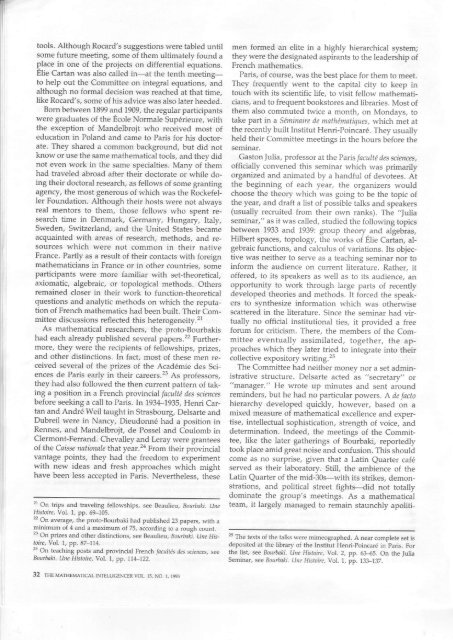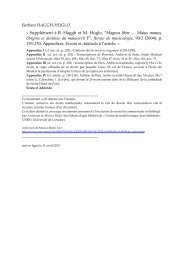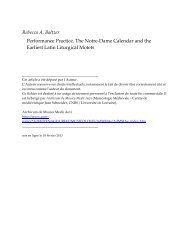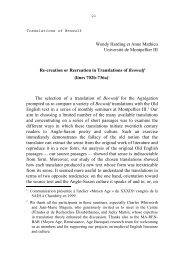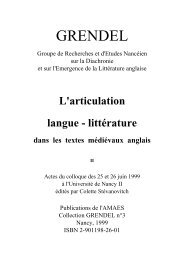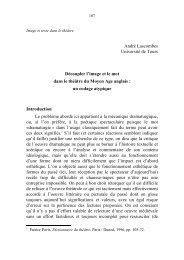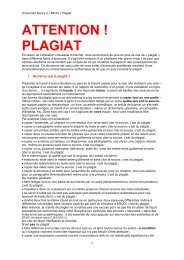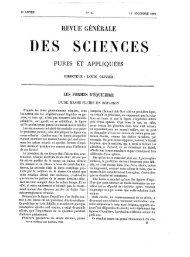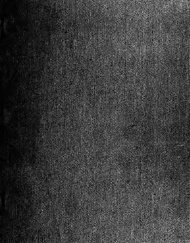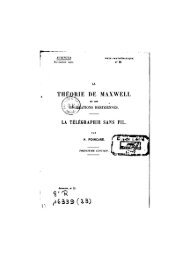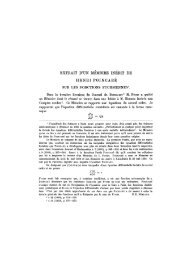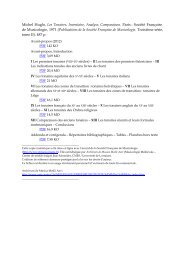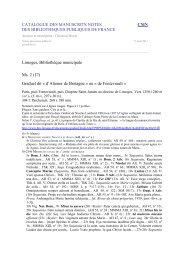Karen V. H. Parshall" A Parisian Café and Ten Proto-Bourbaki ...
Karen V. H. Parshall" A Parisian Café and Ten Proto-Bourbaki ...
Karen V. H. Parshall" A Parisian Café and Ten Proto-Bourbaki ...
You also want an ePaper? Increase the reach of your titles
YUMPU automatically turns print PDFs into web optimized ePapers that Google loves.
l'<br />
tools. Although Rocard's suggestions were tabled until men formed an elite in a highly hierarchical systemi<br />
some future rneeting, some of them ultimately found a they were the designated aspirants to the leadership of<br />
p_lace in one of the projects on differential equations. French mathematics.<br />
Elie Cartan was also called in----at the tenth meeting- Paris, of course, was the best place for them to meet.<br />
to help out the Comrnittee on integral equations, <strong>and</strong> They frequently went to the iapital city to keep in<br />
although no formal decision was reached at that time, touch with its scientific life, to visit fellow mathemati-<br />
like Rocard's, some of his advice was also later heeded. cians, <strong>and</strong> to frequent bookstores <strong>and</strong> libraries. Most of<br />
Born between 1899 <strong>and</strong> 1909, the regular participants them also commuted twice a month, on Mondavs, to<br />
were graduates of the École Normale Supeileurefwith take pârt in a Sèminaire de mathématiques, which Àet at<br />
the exception of M<strong>and</strong>elbrojt who received rnost of the recently built Institut Henri-Poincaré. They usually<br />
education in Pol<strong>and</strong> <strong>and</strong> came to Paris for his doctor- held their Committee meetings in the hours bêfore the<br />
ate. They shared a corunon background, but did not semlnar.<br />
know or use the same mathernatical tools, <strong>and</strong> they did Gaston lulia, professor at the Paris faculté des sciences,<br />
not even work in the same specialties. Many of them officially convened this seminar which was primarily<br />
had traveled abroad after their doctorate or while do- organized <strong>and</strong> animated by a h<strong>and</strong>ful of devbtees. Àt<br />
ing their doctoral research, as fellows of some granting the beginning of each year, the organizers would<br />
agency, the most generous of which was the Rockefel- choose the theory which was going to be the topic of<br />
ler Foundation. Although their hosts were not always the year, <strong>and</strong> draft a list of possible talks <strong>and</strong> speakers<br />
real mentors to them, those fellows who spent re- (usually recruited from their own ranks). The<br />
search time in Denmark, Germany, Hungary, Italy,<br />
Sweden, Switzerl<strong>and</strong>, <strong>and</strong> the United States became<br />
acquainted with areas of research, methods, <strong>and</strong> resources<br />
which were not common in their native<br />
France. Partly as a result of their contacts with foreign<br />
mathematicians in France or in other countries, some<br />
participants were more familiar with set-theoretical,<br />
axiomatic, algebraic, or topological methods. Others<br />
remained closer in their work to function-theoretical<br />
questions <strong>and</strong> analytic methods on which the reputation<br />
of French mathematics had been built. Their ëommittee<br />
discussions reflected this heterogeneity.2l<br />
As mathematical researchers, the proto-<strong>Bourbaki</strong>s<br />
had each already published several papers.22 Furthermore,<br />
they were the recipients of fellowships, prizes,<br />
<strong>and</strong> other distinctions. In fact, most of these men received<br />
several of the prizes of the Académie des Sciences<br />
de Paris early in their careers.23 As professors,<br />
they had also followed the then current pâttern of taking<br />
a position in a French prov'rncial t'nculté des sciences<br />
before seeking a call to Paris. In 1934-1935, Henri Cartan<br />
<strong>and</strong> André Weil taught in Strasbourg, Delsarte <strong>and</strong><br />
Dubreil were in Nancy, Dieudonné had a position in<br />
Rennes, <strong>and</strong> M<strong>and</strong>elbroit, de Possel <strong>and</strong> Coulomb in<br />
Clermont-Ferr<strong>and</strong>. Chevalley <strong>and</strong> Leray were grantees<br />
of the Caisse nationale that yéar.2a From their pôvincial<br />
vantage points, they had the freedom to experiment<br />
with new ideas <strong>and</strong> fresh approaches which might<br />
have been less accepted in Paris. Nevertheless, these<br />
,Julia<br />
seminar," as it was called, studied the following topics<br />
between 1933 <strong>and</strong> 1939: group theory <strong>and</strong> algebras,<br />
Hilbert spaces, topology, the works of Élie Cartan, algebraic<br />
functions, <strong>and</strong> calculus of variations. Its obiective<br />
was neither to serve as a teaching seminar nor to<br />
inform the audience on current liteàrure. Rather, it<br />
offered, to its speakers as well as to its audience, an<br />
opportunity to work through large parts of recently<br />
developed theories <strong>and</strong> methods. It forced the speakers<br />
to synthesize in{ormation which was otherwise<br />
scattered in the literature. Since the seminar had virtually<br />
no official institutional ties, it provided a free<br />
forum for criticism. There, the members of the Committee<br />
eventuâlly assimilated, together, the approaches<br />
which they later tried to integrate into their<br />
collective expository writng.25<br />
The Committee had neither money nor a set administrative<br />
structure. Delsarte acted as "secretary" or<br />
"manager." He wrote up minutes <strong>and</strong> sent around<br />
reminders, but he had no particular powers. A de facto<br />
hierarchy developed quickly, however, based on a<br />
mixed measure of mathematical excellence <strong>and</strong> exoertise,<br />
intellectual sophistication, strength of voice, ànd<br />
determination. Indeed, the meetings of the Committee,<br />
like the later gatherings of <strong>Bourbaki</strong>, reportedly<br />
took place amid great noise <strong>and</strong> confusion. This should<br />
come as no surprise, given that a Latin Quarter café<br />
served as their laboratory. Still, the ambience of the<br />
Latin Quarter of the mid-30s-with its strikes, demonstrations,<br />
<strong>and</strong> political street fights-did not totally<br />
dominate the group's meetings. As a mathematical<br />
2r<br />
On trips <strong>and</strong> traveling fellowships, see Beaulieu, <strong>Bourbaki</strong>. Ilne team, it largely managed to remain staunchly apoliti-<br />
Histoile, YoL 1, pp. 69-105.<br />
2<br />
On average, the proto-<strong>Bourbaki</strong> had published 23 papers, with a<br />
minimum of 4 <strong>and</strong> a mayjmuin of 75, according to a rough count.<br />
æ<br />
On prizes <strong>and</strong> other distinctions, see Beatljiu, Boutbaù. LIne Histoirc,<br />
Vol. 1, rp. 87-114.<br />
'?a<br />
On teaching posts <strong>and</strong> provincial French frrultés iles scimces, see<br />
<strong>Bourbaki</strong>. Une Histore, Vol. 1, pp.<br />
5<br />
The texts of the talks were mimeogûphed. A near complete set is<br />
deposited at the libÉry of the Institut Henri-Poincaré in Paris. For<br />
the list, see <strong>Bourbaki</strong>. Une Histoire, Yol. 2, pp, 63*65. On the Julia<br />
Seminar, see Borl,rh. Ufie Histoire, Vol. 1, pp. 133_132.<br />
'n4122.<br />
32 TrIE MATHEMATICAL tNrELucENcER vo|-. 15. No. 1.1993


